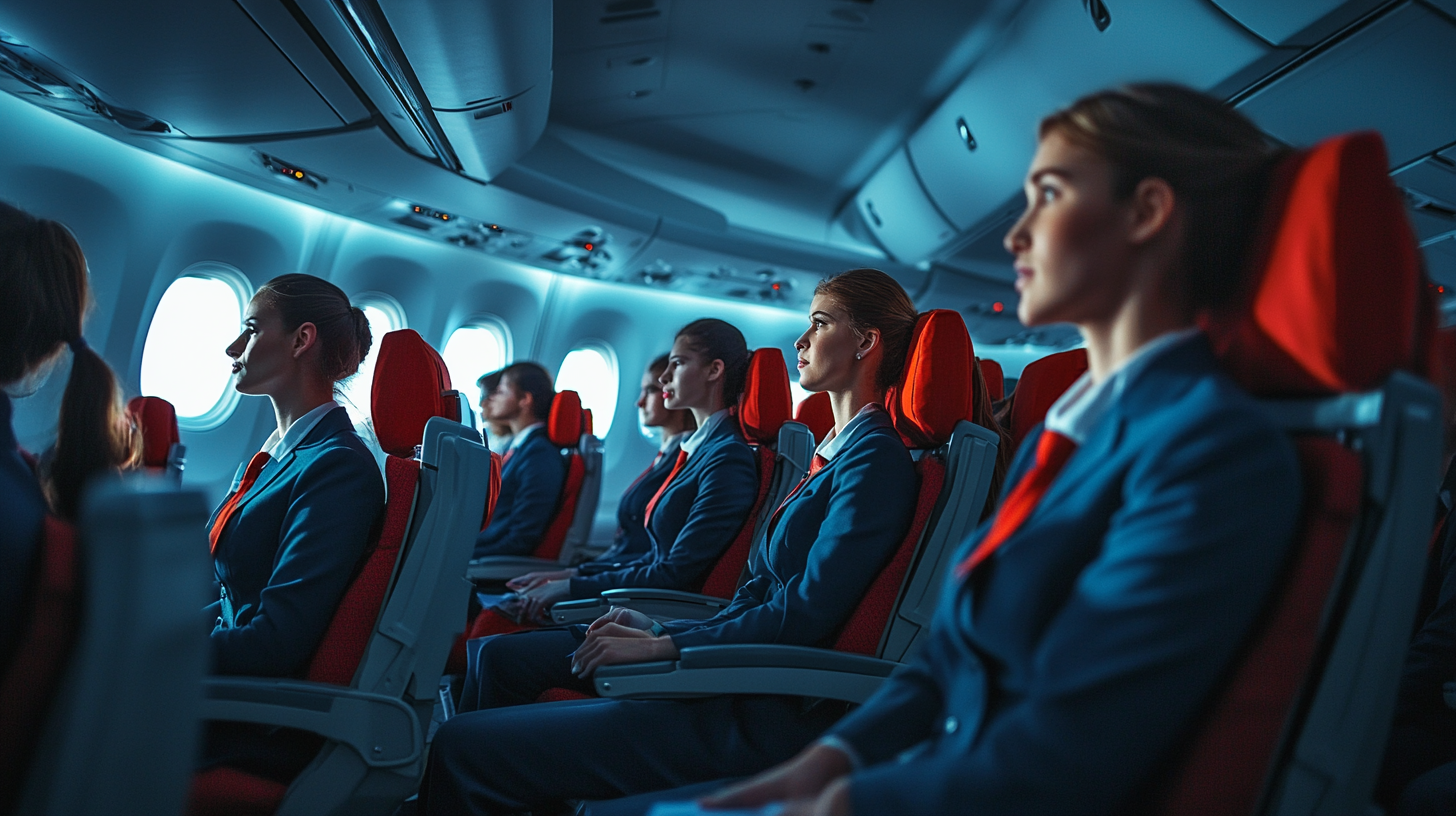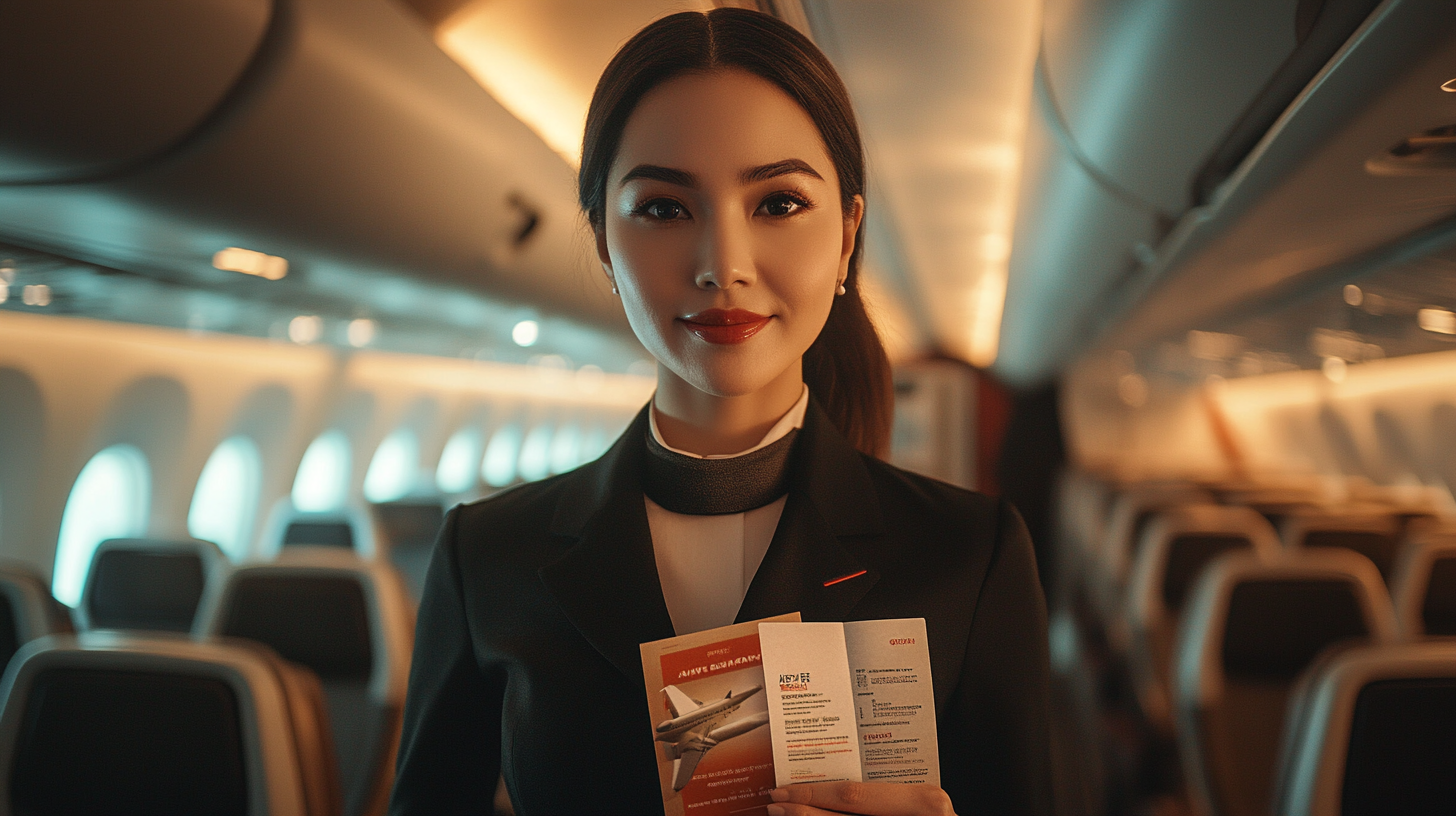How to Become a Flight Attendant: A Comprehensive Guide to a Skyward Career

For many individuals, the allure of turning the world into their office is a captivating prospect. A career as a flight attendant offers not just a job but an opportunity to travel extensively while working. This comprehensive guide outlines the steps to becoming a flight attendant in the United States, delving into the qualifications, training, and dedication required to excel in this competitive and dynamic field. By understanding the path ahead, aspiring flight attendants can prepare themselves to embark on a career that is as rewarding as it is adventurous.
Understanding the Role of a Flight Attendant

Flight attendants are crucial to the airline industry, serving as the front-line personnel responsible for passenger safety and comfort. Beyond the visible tasks of serving meals and beverages, they perform a wide range of duties that are essential for the smooth operation of flights. These include conducting pre-flight safety checks, demonstrating safety procedures, providing first aid, and managing emergency situations. Their role requires a high degree of adaptability and the ability to thrive in fast-paced, ever-changing environments while maintaining professionalism and exceptional customer service.
The profession embodies adventure and demands resilience. Flight attendants often work across different time zones, adapt to varied cultural settings, and handle diverse passenger needs. They are the face of the airline, and their ability to represent the company’s values makes a significant impact on customer satisfaction and the overall travel experience. Understanding the multifaceted nature of this role is essential for anyone considering this career path Comprehensive Overview of Flight Attendant Responsibilities .
Minimum Qualifications and Requirements

To embark on a career as a flight attendant, candidates must meet certain foundational qualifications. At a minimum, a high school diploma or GED is required. However, in a competitive field where airlines receive thousands of applications, additional education can be advantageous. Pursuing a bachelor’s degree in fields such as hospitality, communication, or tourism can enhance a candidate’s profile and provide valuable skills relevant to the industry The Benefits of Higher Education for Flight Attendants .
Airlines also look for candidates with relevant work experience in customer service or sales roles. Such experience demonstrates the candidate’s ability to engage with customers effectively, handle challenging situations, and deliver exceptional service. Strong communication skills, a customer-centric approach, and proficiency in problem-solving are highly valued attributes.
Additional requirements include:
- Eligibility to work in the United States: Candidates must have legal authorization to work in the country, which may include citizenship, permanent residency, or the appropriate work visas.
- Passing background checks and drug screenings: Due to the safety-sensitive nature of the job, thorough background checks and drug tests are mandatory to ensure the integrity and reliability of crew members.
- Physical abilities: Flight attendants must meet specific physical requirements, including the ability to reach certain heights (usually to access overhead compartments) and lift luggage that can weigh up to 50 pounds or more. Maintaining physical fitness is important for performing duties efficiently.
- Flexibility to work irregular schedules: The nature of air travel requires flight attendants to work at any time, including nights, weekends, and holidays. They must be adaptable to changing schedules and time zones.
- Willingness to relocate: Airlines may assign flight attendants to different base locations depending on operational needs. Being open to relocation can increase employment opportunities and career advancement prospects.
- Multilingual skills: Proficiency in multiple languages is a significant asset, particularly for international flights. It enhances communication with passengers and can open doors to more diverse routes Language Skills and Flight Attendant Career Advancement .
Training and Certification

While airlines provide comprehensive training to new hires, obtaining prior flight attendant training can offer a competitive edge. Specialized programs, such as those offered by established institutions with decades of experience, equip students with essential skills including emergency procedures, customer service excellence, and preparation for Federal Aviation Administration (FAA) certification Top Flight Attendant Training Programs . These programs often simulate real-world scenarios, allowing candidates to gain confidence and proficiency before entering the workforce.
Upon acceptance into an airline’s training program, new flight attendants undergo rigorous instruction covering a wide range of topics. The training encompasses safety regulations, aircraft systems, company policies, and first aid. Successful completion of this training is crucial, as it leads to FAA certification—a mandatory requirement for all commercial flight attendants in the United States FAA Certification Process for Flight Attendants . The certification process ensures that all attendants meet the high standards set for passenger safety and service.
The Application Process

The pursuit of a flight attendant position is highly competitive, with airlines receiving over a million applications annually. Application windows are often limited and can vary by airline, making it essential for candidates to stay informed and act promptly. The application process typically involves several key steps:
- Resume Preparation: Crafting a tailored resume that highlights relevant experience and skills is crucial. Emphasize customer service roles, language proficiencies, and any certifications or training that align with the flight attendant position.
- Application Submission: Applications are usually submitted directly through airline websites or official job portals. Ensuring that all qualifications are met and that the application is complete and accurate is essential for consideration.
- Interview Process: The selection process often includes multiple interviews, starting with virtual interviews and progressing to in-person assessments. Candidates may be asked behavioral questions to assess how they would handle specific situations on the job Preparing for Flight Attendant Interviews .
- Event Days and Assessment Centers: Some airlines host special recruitment events or assessment centers where candidates participate in group activities, role-playing scenarios, and face-to-face interviews. These events provide airlines with insights into candidates’ interpersonal skills and teamwork abilities.
Preparation is key to success in the application process. Candidates should research the airline thoroughly, understand its values and culture, and be prepared to demonstrate how they align with these during interviews. Professional attire, punctuality, and a positive attitude are essential traits that airlines look for in potential flight attendants.
Understanding Airline-Specific Requirements

Each airline has its own set of specific criteria, standards, and expectations. Understanding these nuances can significantly improve a candidate’s chances of success. Key areas to consider include:
- Base Locations: Airlines operate from various hubs and may require flight attendants to be based at specific locations. Some airlines offer more flexibility than others, but willingness to accept assigned bases is often a condition of employment Airline Base Assignments Explained .
- Appearance Standards: Airlines typically have guidelines regarding uniforms, grooming, and personal appearance. These standards are part of the airline’s brand image and customer experience strategy. Familiarity with these requirements demonstrates professionalism and attention to detail.
- Language Skills: Airlines that operate international flights may require proficiency in specific languages. Positions for bilingual or multilingual flight attendants often come with additional responsibilities and benefits Language Requirements for International Flight Attendants .
- Service Experience: Some airlines may prefer candidates with prior experience in hospitality or aviation. Understanding the airline’s target market and service style can help tailor the application and interview responses.
Researching and aligning with an airline’s specific requirements not only improves the application but also helps candidates determine which airlines are the best fit for their career aspirations.
Benefits and Compensation

A career as a flight attendant comes with a range of benefits that make it a highly desirable profession. These benefits often extend beyond the attractive salary and include unique perks associated with the lifestyle:
- Competitive Salary: Flight attendants earn a median annual salary of $68,370, with the potential to earn more based on experience, seniority, and the airline. Some flight attendants earn between $71,577 to $100,019, reflecting factors such as flight hours and additional duties.
- Travel Perks: One of the most significant benefits is the opportunity to travel extensively. Flight attendants often receive free or discounted flights for themselves and, in many cases, for family members. This perk allows them to explore new destinations during their time off Travel Benefits for Flight Attendants .
- Flexible Schedules: The profession offers flexibility, with flight attendants typically working a set number of hours per month. This arrangement can provide extended periods off, allowing for work-life balance and personal pursuits.
- Accommodation Benefits: Airlines provide accommodations for overnight layovers, which can be in domestic or international locations. This not only ensures rest between flights but also offers opportunities to experience different cultures.
- Retirement and Health Benefits: Many airlines offer comprehensive benefits packages, including health insurance, retirement plans, and other employee assistance programs.
The combination of financial rewards and lifestyle benefits contributes to the high level of job satisfaction reported among flight attendants.
Challenges of the Profession

While the role of a flight attendant has many appealing aspects, it also comes with challenges that candidates should consider:
- Irregular Hours: Flight attendants often work long and unconventional hours, including overnight flights, early mornings, and shifts during weekends and holidays. Managing sleep patterns and personal commitments can be challenging.
- Time Away from Home: Extended periods away from home and loved ones are common. This aspect of the job can impact personal relationships and requires strong support systems.
- Reserve Duties: New flight attendants may spend significant time on reserve status, meaning they are on-call and must be ready to report to work on short notice. This unpredictability can affect planning and personal time.
- Physically Demanding: The job can be physically taxing, involving prolonged periods of standing, maneuvering through tight spaces, and managing the effects of jet lag and changes in cabin pressure Coping with the Physical Demands of Flying .
- High Competition: Securing a position requires persistence and resilience due to the high number of applicants and the rigorous selection processes employed by airlines.
Being aware of these challenges allows prospective flight attendants to prepare mentally and physically, ensuring they can meet the demands of the profession with confidence.
Advancing Your Career

Career advancement for flight attendants is influenced by factors such as tenure, performance, and additional qualifications. Opportunities for progression include:
- Senior Flight Attendant Roles: With experience, flight attendants can assume senior positions, leading the cabin crew and overseeing service delivery on flights.
- Specialization: Flight attendants may specialize in areas such as international flights, VIP services, or become trainers and mentors for new recruits.
- Corporate Opportunities: Some flight attendants transition into corporate roles within the airline, including recruitment, training development, and management positions Career Paths for Experienced Flight Attendants .
- Union Leadership: Participation in flight attendant unions can lead to leadership roles, advocating for the rights and interests of crew members.
The airline industry is experiencing dynamic growth, with job projections indicating an increase between 11% to 21% from 2021 to 2031. This expansion presents numerous opportunities for flight attendants who are committed to advancing their careers and embracing new challenges.
Enhancing Your Prospects

To increase the likelihood of securing a flight attendant position and succeeding in the role, candidates can take proactive steps:
- Obtain Specialized Training: Enrolling in reputable flight attendant training programs can provide a competitive edge. Such programs offer comprehensive education on airline operations, safety protocols, and customer service excellence Accredited Flight Attendant Training Schools .
- Develop Customer Service Skills: Gaining experience in customer-facing roles enhances interpersonal skills and demonstrates an ability to handle diverse situations effectively.
- Learn Additional Languages: Proficiency in languages beyond English can set candidates apart and qualify them for international routes and specialized positions.
- Network Within the Industry: Connecting with current flight attendants and industry professionals can provide valuable insights and advice. Attending industry events and joining relevant associations can expand one’s professional network.
- Prepare Thoroughly for Interviews: Practicing common interview questions and scenarios helps candidates articulate their qualifications confidently. Understanding the airline’s culture and expectations is essential for making a strong impression.
Testimonials from successful flight attendants often highlight the importance of perseverance, continuous learning, and a proactive approach to career development Success Stories from Flight Attendants . By taking these steps, candidates can enhance their prospects and position themselves favorably in a competitive field.
Final Thoughts

Becoming a flight attendant is more than a job—it is a lifestyle that offers unparalleled opportunities for exploration, cultural immersion, and personal growth. Those who are dedicated, adaptable, and passionate about delivering exceptional service will find this career immensely rewarding. The journey to the skies requires commitment and effort, but the experience of connecting people around the world and making a positive impact on their travel experiences is truly gratifying.
As the airline industry continues to expand and evolve, the demand for skilled and professional flight attendants is on the rise. There has never been a better time to pursue this exciting career. By preparing thoroughly, staying informed, and embracing the challenges ahead, aspiring flight attendants can set themselves on a trajectory toward success. The sky is not just a destination—it is an opportunity to reach new heights professionally and personally.
Follow us back to Seat 5A for more insights and updates on your journey to becoming a flight attendant.






